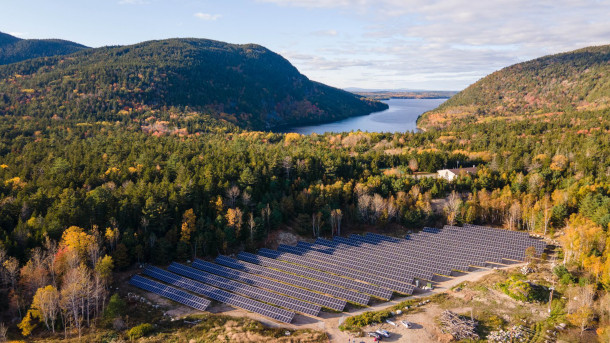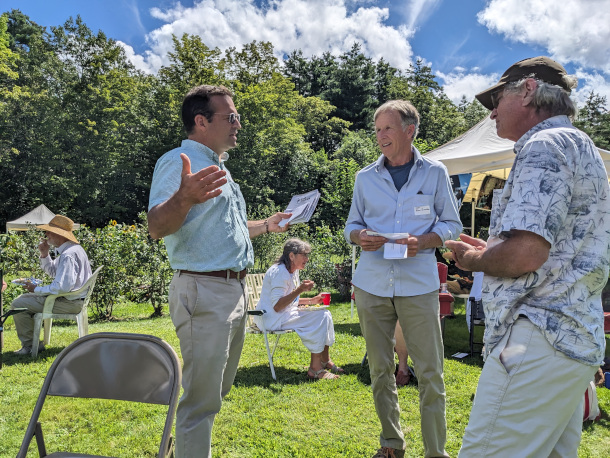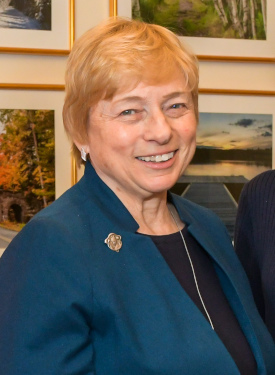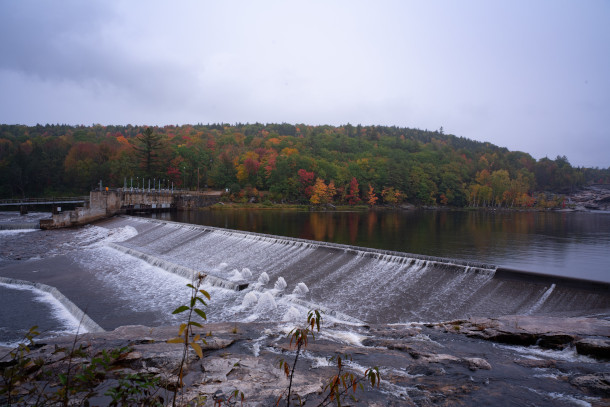Greening Maine's Grid?
Air Date: Week of October 27, 2023

A solar array sits on top of a former landfill in Mount Desert Island, Maine, the home of Acadia National Park. (Photo: ReVision Energy)
On November 7th voters in the state of Maine will be able to choose if they want to replace the state’s two existing for-profit electric utilities with a non-profit utility largely governed by an elected board. Freelance reporter Annie Ropeik discusses with Host Steve Curwood how the new utility could help the state decarbonize its electricity sector.
Transcript
DOERING: It’s Living on Earth, I’m Jenni Doering.
CURWOOD: And I’m Steve Curwood.
On November 7th voters in the state of Maine will be able to choose if they want to replace the state’s two existing for-profit electric utilities with the Pine Tree Power company, a non-profit customer-owned utility largely governed by an elected board. Measures like this proposal have been widely debated for years in Maine, and one was approved by the legislature in 2021, only to be vetoed by the state’s Democratic Governor, Janet Mills. This year proponents are hoping a majority of voters approve this referendum known as Question Three and create a public power company without support from the governor. Freelance reporter Annie Ropeik has been following this story and joins us now from Portland Maine. Welcome to Living on Earth, Annie!
ROPEIK: Hi, thanks.
CURWOOD: So if Maine voters approve what's called Question 3, what would switching to a statewide, nonprofit electric utility look like?
ROPEIK: So this ballot initiative would require the state to find our current investor-owned utilities unfit to serve, and it would have them sell off their systems, their poles and wires, their workforces to this new nonprofit entity. It would be run by a publicly elected board that would also appoint some subject matter experts. And then they would employ a contractor to run the system. And they would be supposed to charge what are called cost of service rates. So they don't turn any profit on top of what it costs to just provide the electricity for people; no shareholders, nothing like that. And they would have some more explicit mandates to help the state meet its climate goals and more accountability measures to report to the state on how they're doing accommodating that transition.
CURWOOD: So what's the promise for consumers' pocketbooks?
ROPEIK: The promise is mixed and uncertain and complicated. Economic analyses show long term decreases in rates. So because the new utility would not, again, be able to turn that profit, it would, on the whole, in the long term, lower rates for consumers. That's the expectation. In the short term, there is a lot of uncertainty about how much it will cost to sell the current utilities. That price is not set yet. There's expected to be a lot of debate in court, likely, about what that price should be. And that could have an effect about whether rates rise in the short term.

Seth Berry, left, an author of the Pine Tree Power proposal and a former Democratic state representative, answers questions from potential voters at a gathering of climate activists at a home in Winslow, Maine, on Aug. 19, 2023. (Photo: Annie Ropeik)
CURWOOD: Now who's pushing for this?
ROPEIK: The ballot initiative is backed by a number of climate and environmental groups. 350 and the Sierra Club have endorsed it. Bill McKibben has spent time up here in Maine campaigning for the initiative. Maine's environmental groups are really mixed on it, they all seem to agree that there's a lot of uncertainty, they're unhappy with the status quo, where the transition to renewable energy has been slow at times. They're not sure if this will create any less complication. But some of them say, you know, better than business as usual. Some of them say it's not worth the risk. And, you know, generally we've seen the campaign, I think, really pitching itself to younger voters on climate action, on just the dissatisfaction that people have with our current utilities on things like rates and reliability and service. And that's pretty much the pitch to voters. But it's a really mixed bag at this point as to whether it will pass, frankly.
CURWOOD: Yeah, I was gonna ask you to look at your political prognostication crystal ball and tell us what the results will be. And you're saying, who knows?

Maine Governor Janet Mills vetoed a 2021 bill that would have created a statewide nonprofit electric utility. (Photo: Rebecca Hammel, U.S. Senate, Wikimedia Commons, Public Domain)
ROPEIK: Yeah, I think it's gotten more public traction than I think I expected. You know, people are talking about it. It's gotten a ton of just advertising and media attention, maybe more so than I expected initially, when I think some of the press was like, maybe a little hesitant to touch it, because it's just, it is quite a big leap, right? It's a big solution, a big change. But especially in these past few months leading up to the election, there's just been a ton of conversation. It's gotten some national attention. And I think people are starting to hear about it more and have realized that they need to form an opinion. But the utilities, the incumbent utilities have spent millions of dollars. They're outspending supporters about 30 to one right now.
CURWOOD: Wait, wait, wait -- So the utilities that will get to keep their jobs are spending 30 to one on the public proponents' side?
ROPEIK: That's correct. Yeah, the incumbent utilities, which are Central Maine Power and Versant power, they're both owned by large, foreign-owned corporations, have spent more than $24 million to date on campaigning and advertising, direct mail, lot of digital ads. And the supporters of the Pine Tree Power plan have spent, I think about $850,000 to date, so it's about a 30 to one ratio on spending.
CURWOOD: By the way, how would this Pine Tree Power plan help Maine continue to decarbonize the electricity sector?

Rumford Falls Project is a hydroelectric dam on the Androscoggin River in Maine. More than a quarter of Maine’s in-state power generation comes from hydroelectric projects. (Photo: notnyt, Flickr, CC BY-NC-ND 2.0)
ROPEIK: So the new utility would have this explicit purpose to help the state meet its climate goals, and Maine has pretty aggressive climate goals. We want to be 80% renewable by 2030, a number of other goals -- Maine has pushed really hard for things like heat pumps. And so the new utility would be required to help with those efforts and to report to the state on exactly how it's doing on helping aid those efforts. Maine is deregulated, which means our electric transmission and distribution utilities can't also own power plants. So you can't own both the poles and wires and the power plants, you have to split those up. So the utilities, regardless of their ownership structure only have so much control over that fuel mix and over renewables adoption. But the experts I've been talking to say a transmission utility does have a huge role to play in modernizing the grid and creating a grid that can accommodate all those new renewables and respond to climate change. So they have a huge role play, a huge amount of investment they need to make in enabling this transition quickly and equitably.
CURWOOD: Okay, Annie, before you go, I want you to put on your sociologist's hat. What does this election over having a single publicly owned power company, what does it say about how people feel in Maine about electricity, about the climate crisis, about the role of government in general?
ROPEIK: It's a great question. I've thought a lot about this. I really see this election as a statement on who people want as a leader, as we undertake this incredibly complex and important transition. Do they want government leadership, public leadership, sort of democratized leadership? Or do they trust businesses and, you know, whatever version of the free market exists in the energy system, and the power of the investment incentive? Do they trust that to lead the charge? It also just says a lot about how broken trust between utilities and regulators in the public can lead to big swings like this at the ballot box. You know, I think a lot of the experts I've talked to have said, if you had a state where people were happier with their utilities, where there hadn't been a lot of problems with the reliability, where the rates weren't really high, you know, people weren't just sort of overall mistrustful of the incumbent companies, that you wouldn't see it come to something like this. So the ownership structure doesn't inherently address the climate crisis, but it could create more of that public trust and regulatory accountability to ease the transition, especially given just the frustration and kind of log jams we're facing in our current system.

Annie Ropeik is an award-winning independent climate journalist based in southern Maine. She writes for The Maine Monitor, Inside Climate News and others. (Photo: Annie Ropeik)
CURWOOD: Well, thanks for taking the time with us today. Annie Ropeik is a freelance reporter who's written about this for the Maine Monitor and our media partner, Inside Climate News. Thanks again for taking the time.
ROPEIK: Thank you so much, Steve.
CURWOOD: And tune in next week to hear about another way to decarbonize the power grid through what are called “virtual power plants” that rely on smart thermostats, EV batteries and more.
Links
The Maine Monitor | “Debating Maine’s Energy Future in Question 3”
Living on Earth wants to hear from you!
Living on Earth
62 Calef Highway, Suite 212
Lee, NH 03861
Telephone: 617-287-4121
E-mail: comments@loe.org
Newsletter [Click here]
Donate to Living on Earth!
Living on Earth is an independent media program and relies entirely on contributions from listeners and institutions supporting public service. Please donate now to preserve an independent environmental voice.
NewsletterLiving on Earth offers a weekly delivery of the show's rundown to your mailbox. Sign up for our newsletter today!
 Sailors For The Sea: Be the change you want to sea.
Sailors For The Sea: Be the change you want to sea.
 The Grantham Foundation for the Protection of the Environment: Committed to protecting and improving the health of the global environment.
The Grantham Foundation for the Protection of the Environment: Committed to protecting and improving the health of the global environment.
 Contribute to Living on Earth and receive, as our gift to you, an archival print of one of Mark Seth Lender's extraordinary wildlife photographs. Follow the link to see Mark's current collection of photographs.
Contribute to Living on Earth and receive, as our gift to you, an archival print of one of Mark Seth Lender's extraordinary wildlife photographs. Follow the link to see Mark's current collection of photographs.
 Buy a signed copy of Mark Seth Lender's book Smeagull the Seagull & support Living on Earth
Buy a signed copy of Mark Seth Lender's book Smeagull the Seagull & support Living on Earth

